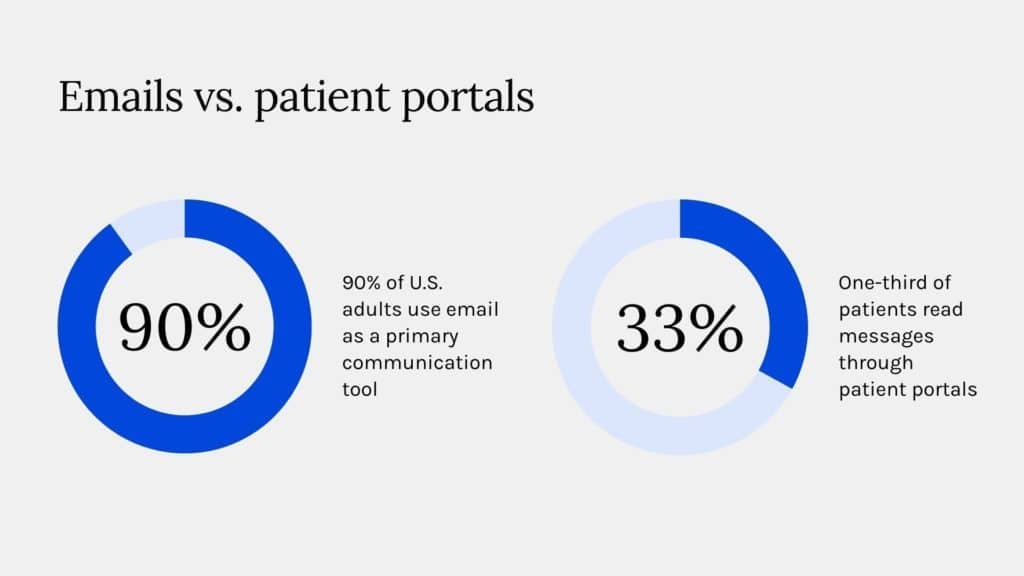2 min read
The transformative power of email for your patients
Anne-Marie Sullivan November 30, 2022

Effective communication is the foundation of any practitioner-patient relationship. HIPAA compliant email has revolutionized patient communication, providing numerous benefits and transforming the patient experience. It is a powerful tool that enhances convenience, accessibility, and the patient-provider relationship. These positive aspects of email communication for patients demonstrate its transformative power in healthcare.
Research on the impact of physician email communication has been positive, with patients and providers noting convenience and improved quality of care. The outcomes reported were increased access to healthcare providers, enhancements in communication between patients and providers, improvements in meeting patients' informational needs, increased patient empowerment, and improved blood sugar control among diabetic patients who received supportive emails.
The convenience and accessibility of email communication
90% of us adults use email. 33% of patients read messages through patient portals.
Patients can send messages to their healthcare providers at their convenience without being constrained by office hours or phone availability. This time-saving aspect allows patients to articulate their concerns, ask questions, or seek clarifications whenever needed, fostering a sense of empowerment and engagement in their healthcare journey.
Additionally, email communication transcends geographical barriers. Patients living in remote areas with limited access to healthcare facilities can reach out to their providers easily. This accessibility is particularly crucial for patients with mobility issues or disabilities who may find it challenging to visit a healthcare facility in person. By eliminating the need for physical presence, email ensures that patients receive care regardless of location.
Enhanced patient-provider relationship
Email communication strengthens the bond between patients and healthcare providers. It offers patients increased accessibility to their healthcare professionals, enabling direct communication without intermediaries. Patients can share their symptoms, report progress, or discuss concerns directly with their providers, leading to more personalized care.
Prompt responses are another advantage of email communication. Healthcare providers can respond to patient emails promptly, reducing wait times and alleviating anxiety. This feedback loop enhances patient satisfaction and allows for early intervention when necessary, potentially improving patient outcomes.
Improved care coordination and efficiency
Providers can share test results, treatment plans, and referrals with ease, ensuring that all relevant parties are promptly informed. This real-time dissemination of information facilitates multidisciplinary collaboration, enabling different specialists involved in a patient's care to communicate efficiently. Email serves as a bridge that brings together healthcare professionals, resulting in more coordinated and comprehensive care.
Administrative tasks are also made more efficient through HIPAA compliant email communication. Appointment scheduling and reminders can be easily managed, minimizing no-shows and optimizing healthcare resources. Additionally, email reduces paperwork by allowing for digital record-keeping and documentation, ensuring patient information is easily accessible and securely stored.
Privacy and security concerns
While the advantages of email communication are substantial, it is essential to address patient privacy and security concerns. Healthcare providers must adhere to HIPAA regulations to protect patient information. Encryption and secure email platforms, like Paubox Email Suite, are employed to safeguard sensitive data during transmission. Educating patients and providers about email etiquette and best practices mitigates privacy risks.
Potential challenges and limitations
Without non-verbal cues, misinterpretation of messages can occur, leading to communication gaps or misunderstandings. Clear and concise communication and judicious use of appropriate language are central to overcoming this challenge.
Furthermore, managing a large volume of patient emails can be overwhelming for healthcare providers. Email overload may hinder timely responses and compromise the quality of care. Implementing effective email management strategies, such as triaging urgent messages and setting realistic response expectations, can help providers address these challenges and ensure efficient email communication.
Related: HIPAA compliant email: the definitive guide
HIPAA compliant email is transformative
Email has truly transformed patient communication, revolutionizing the healthcare landscape. Moving forward, patients and healthcare providers must embrace the transformative power of email and harness its potential for continued growth and improvement in healthcare communication. By leveraging the convenience, accessibility, and efficiency of email, we can enhance the patient experience and create a more connected and patient-centered healthcare system.
Subscribe to Paubox Weekly
Every Friday we'll bring you the most important news from Paubox. Our aim is to make you smarter, faster.




